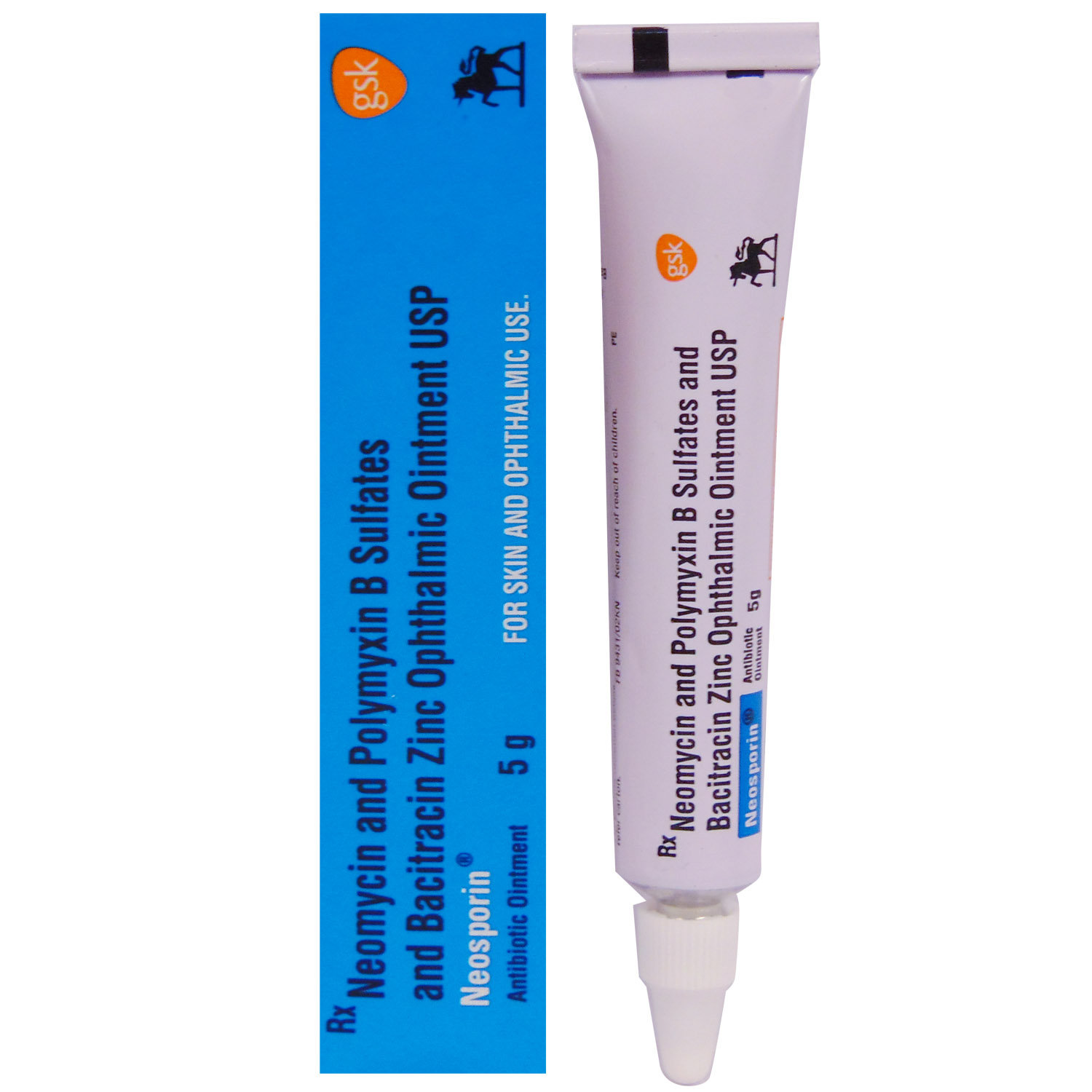Bacitracin+neomycin+polymyxin B
About Bacitracin+neomycin+polymyxin B
Bacitracin+neomycin+polymyxin B is an ophthalmic medication that belongs to the class of 'antibiotics' and is primarily used to treat bacterial infections of the eye, such as conjunctivitis (inflammation of the mucous membrane (conjunctiva) of the eye), keratitis (inflammation of the cornea), keratoconjunctivitis (inflammation of conjunctiva and cornea), blepharitis (inflammation of the eyelids), and blepharoconjunctivitis (inflammation of conjunctiva and eyelids). Bacterial infection occurs when harmful bacteria grow in the body and causes illness.
Bacitracin+neomycin+polymyxin B is composed of three antibiotic medicines: Bacitracin, Neomycin, and Polymyxin B. Bacitracin works by inhibiting the bacterial cell wall synthesis. Neomycin prevents the synthesis of essential proteins required by bacteria to carry out vital functions. Polymyxin B destroys the bacterial membranes and causes the loss of essential metabolites in bacteria. Thereby, Bacitracin+neomycin+polymyxin B helps treat bacterial eye infections.
Your doctor will advise the appropriate dose that suits your infection. Common side effects of Bacitracin+neomycin+polymyxin B include itching, redness of the eye, stinging/burning sensation, temporary blurred vision, and eye irritation. These side effects may not occur in every patient using this medication and differ individually. If the side effects persist longer or worsen, please seek a doctor's advice.
Let your doctor know if you are allergic to Bacitracin+neomycin+polymyxin B or any other medications. Avoid contact of the dispensing container with the eye, eyelids, fingers, and other surfaces to prevent contamination. Pregnant and breastfeeding women should consult their doctor before starting Bacitracin+neomycin+polymyxin B. This medicine may cause temporary blurred vision; hence drive only when you are alert and have clear vision. Bacitracin+neomycin+polymyxin B is recommended for children only if advised by a doctor.
Uses of Bacitracin+neomycin+polymyxin B
Medicinal Benefits
Bacitracin+neomycin+polymyxin B is composed of three antibiotic medicines, namely Bacitracin, Neomycin, and Polymyxin B. Bacitracin is a bacteriostatic medicine (stops the growth or reproduction of bacteria) that works by inhibiting the bacterial cell wall synthesis. Neomycin is an aminoglycoside antibiotic and prevents the synthesis of essential proteins required by bacteria to carry out vital functions. Polymyxin B, an antibiotic, destroys the bacterial membranes by binding to the phospholipids on the cell membranes of gram-negative bacteria. This process of binding causes the loss of essential metabolites in bacteria. Together, Bacitracin+neomycin+polymyxin B helps treat bacterial eye infections.
Directions for Use
Storage
Side Effects of Bacitracin+neomycin+polymyxin B
- Itching
- Redness of the eye
- Stinging/burning sensation
- Temporary blurred vision
- Eye irritation
Drug Warnings
Inform your doctor if you have had any allergic reactions to Bacitracin+neomycin+polymyxin B. If you wear contact lenses, remove them while administering the medicine into the eye. It is advised to check with your doctor before using Bacitracin+neomycin+polymyxin B if you are pregnant or breastfeeding. Avoid driving, or operating machines since Bacitracin+neomycin+polymyxin B may cause temporary blurred vision for a while. Bacitracin+neomycin+polymyxin B should not be used in children unless advised by a doctor.
Drug Interactions
Drug-Drug Interaction: No interactions were found.
Drug-Food Interaction: No interactions were found.
Drug-Disease Interaction: Brief your doctor if you have a medical history of allergic reactions to antibiotic eye medicines before taking Bacitracin+neomycin+polymyxin B.
Drug-Drug Interactions Checker List:
Safety Advice

Alcohol
cautionThere is limited information on how alcohol consumption affects Bacitracin+neomycin+polymyxin B. Please consult your doctor.

Pregnancy
cautionIt is advised to consult your doctor if you plan to conceive or are already pregnant before starting Bacitracin+neomycin+polymyxin B.

Breast Feeding
cautionThere are limited studies on how Bacitracin+neomycin+polymyxin B affects breastfed infants. Please consult your doctor before using Bacitracin+neomycin+polymyxin B if you are breastfeeding.

Driving
cautionBacitracin+neomycin+polymyxin B may cause side effects like blurry vision, affecting your driving ability. Do not drive or operate machinery in such cases. Drive only when you are alert and have clear vision.

Liver
cautionLet your doctor know if you have any history of liver diseases or hepatic impairment. Your doctor will weigh the benefits and potential risks before prescribing Bacitracin+neomycin+polymyxin B.

Kidney
cautionLet your doctor know if you have any history of kidney diseases. Your doctor will weigh the benefits and potential risks before prescribing Bacitracin+neomycin+polymyxin B.

Children
cautionBacitracin+neomycin+polymyxin B is not recommended for children unless advised by a doctor.
Habit Forming
Diet & Lifestyle Advise
- Manage stress, eat healthily, drink plenty of water, exercise regularly, and get plenty of sleep.
- Eat food rich in antioxidants such as berries, spinach, kidney beans, dark chocolate, etc.
- Know your allergy triggers, such as pollen, dust and other factors.
- Do not rub your eyes even though some ophthalmic drugs make your eye itchy.
- If you wear contact lenses: Clean and replace contact lenses more often. Never share contact lenses. Always remember to wash your hands before inserting and after removing the contact lens.
- Avoid staring at the digital screens for longer durations. Rest your eyes every 20 minutes.
- Avoid or limit the intake of alcohol and caffeine.
Special Advise
It is advised to contact your doctor if the infection symptoms persist or worsen after two weeks of treatment.
Patients Concern
Disease/Condition Glossary
Bacterial eye infection: A bacterial eye infection occurs when bacteria invade any part of the eyeball or its surrounding tissues, including the cornea (clear front surface of the eye) and the conjunctiva (thin membrane lining the outer eye and inner eyelids). A bacterial eye infection symptoms include red eyes, pain, swelling of the eyes, watery eyes, itching, and blurry vision. Some very common eye infections are conjunctivitis (the inflammation and irritation of the eye's mucous membrane, conjunctiva), stye (bump on the eyelid), uveitis (inflammation of the uvea-middle layer of the eye), marginal keratitis (inflammation of the cornea), and blepharitis (inflammation of the eyelids).
FAQs
Bacitracin+neomycin+polymyxin B consists of antibiotic medications, namely: Bacitracin, Neomycin and Polymyxin B. It inhibits bacteria's growth by causing damage to its cell wall and prevents the synthesis of essential proteins required by bacteria to carry out their vital functions.
Avoid wearing contact lens while using Bacitracin+neomycin+polymyxin B. It is advised to wear spectacles until the infection is cleared. Also, remember to wash your hands before and after administering the medicine to avoid contamination.
If you use other eye ointments/drops along with Bacitracin+neomycin+polymyxin B, it is advised to maintain a gap of at least 5-10 minutes after each administration. Also, use eye drops before applying any eye ointment.
Prolonged use of eye ointment can cause an overgrowth of other microorganisms like fungi and bacterial resistance.
Avoid the contact of the dropper or tube tip with fingers, eyes, and eyelids while using Bacitracin+neomycin+polymyxin B. Topical eye products, when contaminated by patients with eye diseases, bacterial keratitis (an infection of the cornea) and ocular infections (eye infections), may occur.









